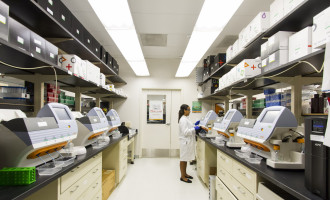
UCLA Jonsson Comprehensive Cancer Center researchers studying cancer evolution have created a framework to help determine which tool combinations are best for pinpointing the exact timing of DNA mutations in cancer genomes.
The study was published online in Nature Communications.
There are currently many different algorithms that researchers have developed to help determine the timing of mutations, but until now, it has been unclear which algorithm will work best for which cancer, and what common biases influence their results.
Cancer is a disease of the genome.
As a cancer develops, its DNA is constantly acquiring new mutations and the population of cancer cells is continuously evolving.
Knowing the order of changes that have happened allows researchers to study the evolution of the cancer over time and see how the cancer cell population may have diversified, or became more uniform.
The diversity or uniformity in the cancer cell population is related to patient response to therapy and reveals vulnerabilities that can be used to create highly targeted treatments.
The study assessed 22 different pipelines for timing mutations in cancer genomes.
Researchers tested the algorithms on a cohort of nearly 300 clinical prostate cancer samples to evaluate each pipeline and see how their results differed in various aspects.
This allowed the team to see the variability across tools and have an unbiased view of how each performed.
Understanding when and why a tumour metastasises, or spreads to other parts of the body, can influence how a person with cancer is treated.
The framework developed in the study can help researchers decide which tool would be the most accurate for their case and generate a more personalised and targeted treatment plan for patients, minimising the risk of cancer coming back in the future.
The senior author is Paul Boutros, PhD, a professor of urology and human genetics at the David Geffen School of Medicine at UCLA who serves as associate director of cancer informatics at the UCLA Institute for Precision Health and director of cancer data science at the Jonsson Cancer Center.
The first author is Lydia Liu, a PhD candidate at the University of Toronto and Visiting Graduate Researcher at UCLA, co-supervised by Dr. Thomas Kislinger at the University of Toronto and Dr. Boutros at UCLA.
Source: UNIVERSITY OF CALIFORNIA - LOS ANGELES HEALTH SCIENCES
The World Cancer Declaration recognises that to make major reductions in premature deaths, innovative education and training opportunities for healthcare workers in all disciplines of cancer control need to improve significantly.
ecancer plays a critical part in improving access to education for medical professionals.
Every day we help doctors, nurses, patients and their advocates to further their knowledge and improve the quality of care. Please make a donation to support our ongoing work.
Thank you for your support.